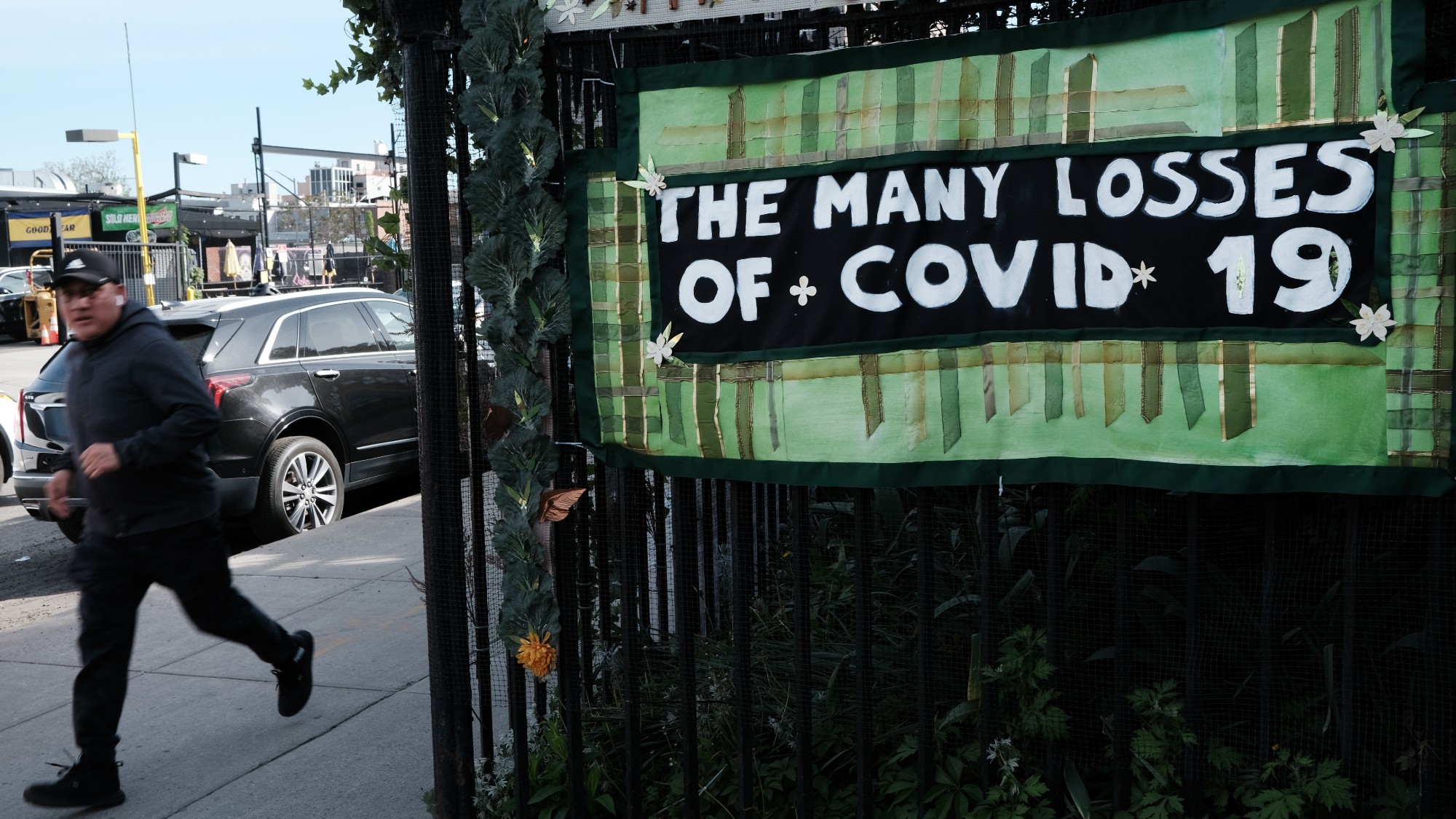The pandemic killed the common good
On the death of one of America's favorite ideas


A free daily email with the biggest news stories of the day – and the best features from TheWeek.com
You are now subscribed
Your newsletter sign-up was successful
It's too early to calculate the price of the pandemic. To date, more than 600,000 Americans have died and over 34 million have gotten sick. Economists estimate trillions of dollars, millions of jobs, and thousands of businesses lost. And those are just the direct consequences. Loneliness, anxiety, and social disruption have downstream effects including a surge in drug overdoses.
Under these bitter circumstances, it may seem frivolous to think about what the pandemic means for political theory. Despite that risk, I want to consider an intellectual casualty of COVID-19: the idea of "the common good," a shared framework for determining what members of a political community owe each other. The experiences of the last 18 months show how little help the concept offers in resolving our disputes.
That may be a counter-intuitive assessment. The common good has rarely seemed more relevant. While it's possible to talk about things like school closures or mask requirements solely in terms of personal profit or preference, it's unsatisfying. Whether or not we use the term, the "common good" is how we conceive of extensive obligations that transcend capricious or selfish interests.
The Week
Escape your echo chamber. Get the facts behind the news, plus analysis from multiple perspectives.

Sign up for The Week's Free Newsletters
From our morning news briefing to a weekly Good News Newsletter, get the best of The Week delivered directly to your inbox.
From our morning news briefing to a weekly Good News Newsletter, get the best of The Week delivered directly to your inbox.
The common good is also enjoying something of an intellectual revival. Over the last few years, mostly Catholic thinkers have invoked the concept as an alternative to quantitative, materialistic measures of wellbeing. In these discussions, the common good tends to justify a more active economic role for government. Sen. Marco Rubio (R-Fla.) adopted that position in a 2019 speech in favor of "common good capitalism" that promotes dignified work as well as GDP growth.
The idea of the common good isn't new or doctrinally religious, though. It's built into the American political tradition. We call our government a "republic," adapting the Latin term respublica or "public thing." Appeals to shared purposes infuse our founding documents — for instance, the commitment to "the general welfare" in the preamble to the Constitution — balancing more familiar invocations of individual liberty. Our institutions do protect freedom, but are also supposed to guide us toward the same purposes.
Under these circumstances, the case for the common good seems rather powerful. But there's a problem: We don't agree about what it involves. At a very general level, we all want to pursue goals like health, prosperity, and the diffusion of knowledge. But it gets hard when we confront tradeoffs among genuinely desirable purposes.
Early in the pandemic, then-president Trump made the case for ending lockdowns by tweeting that "WE CANNOT LET THE CURE BE WORSE THAN THE PROBLEM ITSELF." The statement encouraged tension with advisors, including National Institute of Allergy and Infectious Diseases chief Anthony Fauci, who believed stricter measures were justified to stop the spread of the virus. Both men, and the factions they led, believed they were pursuing the common good, which includes economic and social wellbeing as well as physical health. But different assessments of the costs and benefits pointed toward very different policies.
A free daily email with the biggest news stories of the day – and the best features from TheWeek.com
Debates about school closures are another example. Teachers unions maintained that health risks to school staff, students, and families outweighed the value of in-person instruction. Many parents disagreed, pointing out the low rate of infection and mildness of symptoms among children and expressing fears about isolation and learning loss. Both positions could plausibly be understood as efforts to achieve the common good. Again, though, the practical conclusions were in tension.
I don't want to be naive about these disputes. Invocations of the common good are often a pretext for personal or group demands that they're supposed to transcend. Even if not intentionally misleading, how we perceive the common good is inevitably colored by private incentives. When the General Motors executive and stockholder Charles E. Wilson was appointed Secretary of Defense in 1953, he expressed skepticism about any possible tension between his obligation to the Constitution and his financial interests because "for years I thought what was good for our country was good for General Motors, and vice versa."
If naivete is one risk in assessing talk about common good, though, cynicism is another. Political philosopher John Rawls described the inevitability of disagreement about the common good as the "burdens of judgment." The obstacle to consensus isn't just that we have different interests. Social phenomena are complex, the data are murky, and perceptions of any situation are influenced by each person's unique dispositions and experiences. As a result, even people who are reasoning in good faith and using the same information will tend to reach different conclusions.
The burdens of judgment are glaring in the current debate about vaccines. Last week, National Review's Michael Brendan Dougherty provoked a minor controversy by arguing that media censorship and social shaming are unlikely to persuade Americans who refuse vaccination. Responding to Dougherty's critics, The New York Times' Ross Douthat noted that a personal history of bad experiences with the medical system might encourage reasonable people to avoid a new treatment that still lacks formal approval from the FDA. That helps explain why resistance is correlated with race, education, and geography as well as political partisanship.
The conclusion that disagreement is inevitable could be read as an argument that because it's hard to agree, we shouldn't attempt any collective action. That's not my intention either. More than a year on, I'm convinced that the common good involves open businesses, schools, religious congregations, and that keeping them open requires as close to universal vaccination as we can get. I have logistical and principled concerns about the sweeping requirements recently imposed in France. But vaccine mandates for people who will be living and working in close quarters, such as college dorms, the military, and cruise ships, seem fine.
But I also recognize that many Americans disagree on these points. In a federal republic with powers divided among branches and between national and state governments, this disagreement makes it unlikely that people who share my views will be able to impose them. Even if we could do that as a matter of law, widespread disapproval might make enforcement counterproductive. Our experiments with alcohol and drug prohibition suggest that even when coercion achieves its direct goal, it can destabilize public order in different and often unanticipated ways.
For these reasons, the rhetoric of the common good doesn't seem very helpful in navigating our present challenges. Even when deployed sincerely, it's too broad, too moralistic, and too contestable to persuade anyone to alter their behavior. A recent study found that observing friends or family members who didn't experience side effects was the biggest factor in convincing vaccine skeptics to change their minds. Appeals to social obligation or the general welfare won't cut it, however tempting the feeling of moral and intellectual superiority they flatter.
A better use of the concept of the common good is to remind us that we need to think about the complex and often contradictory relations between individual behavior, public policies, and social institutions rather than fixating on a single political value or quantifiable outcome. Insisting on personal freedom to avoid vaccination encourages further outbreaks, for example, while pursuing reduced case counts requires unpopular and unenforceable restrictions. Even with the best intentions, neither promotes a widely shared goal: returning to normal life. Instead, it's more promising to identify focused responses to specific problems. In this case, simply paying people to be vaccinated, as Douthat has suggested, might help.
But it's all just another way of saying that the kind of tradeoffs, compromises, and unforeseen circumstances that we've faced recently are inescapable in economics, education, and other fields beyond public health. The common good isn't good enough.
Samuel Goldman is a national correspondent at TheWeek.com. He is also an associate professor of political science at George Washington University, where he is executive director of the John L. Loeb, Jr. Institute for Religious Freedom and director of the Politics & Values Program. He received his Ph.D. from Harvard and was a postdoctoral fellow in Religion, Ethics, & Politics at Princeton University. His books include God's Country: Christian Zionism in America (University of Pennsylvania Press, 2018) and After Nationalism (University of Pennsylvania Press, 2021). In addition to academic research, Goldman's writing has appeared in The New York Times, The Wall Street Journal, and many other publications.
-
 Political cartoons for February 19
Political cartoons for February 19Cartoons Thursday’s political cartoons include a suspicious package, a piece of the cake, and more
-
 The Gallivant: style and charm steps from Camber Sands
The Gallivant: style and charm steps from Camber SandsThe Week Recommends Nestled behind the dunes, this luxury hotel is a great place to hunker down and get cosy
-
 The President’s Cake: ‘sweet tragedy’ about a little girl on a baking mission in Iraq
The President’s Cake: ‘sweet tragedy’ about a little girl on a baking mission in IraqThe Week Recommends Charming debut from Hasan Hadi is filled with ‘vivid characters’
-
 The billionaires’ wealth tax: a catastrophe for California?
The billionaires’ wealth tax: a catastrophe for California?Talking Point Peter Thiel and Larry Page preparing to change state residency
-
 Bari Weiss’ ‘60 Minutes’ scandal is about more than one report
Bari Weiss’ ‘60 Minutes’ scandal is about more than one reportIN THE SPOTLIGHT By blocking an approved segment on a controversial prison holding US deportees in El Salvador, the editor-in-chief of CBS News has become the main story
-
 Has Zohran Mamdani shown the Democrats how to win again?
Has Zohran Mamdani shown the Democrats how to win again?Today’s Big Question New York City mayoral election touted as victory for left-wing populists but moderate centrist wins elsewhere present more complex path for Democratic Party
-
 Millions turn out for anti-Trump ‘No Kings’ rallies
Millions turn out for anti-Trump ‘No Kings’ ralliesSpeed Read An estimated 7 million people participated, 2 million more than at the first ‘No Kings’ protest in June
-
 Ghislaine Maxwell: angling for a Trump pardon
Ghislaine Maxwell: angling for a Trump pardonTalking Point Convicted sex trafficker's testimony could shed new light on president's links to Jeffrey Epstein
-
 The last words and final moments of 40 presidents
The last words and final moments of 40 presidentsThe Explainer Some are eloquent quotes worthy of the holders of the highest office in the nation, and others... aren't
-
 The JFK files: the truth at last?
The JFK files: the truth at last?In The Spotlight More than 64,000 previously classified documents relating the 1963 assassination of John F. Kennedy have been released by the Trump administration
-
 'There is a certain kind of strength in refusing to concede error'
'There is a certain kind of strength in refusing to concede error'instant opinion 'Opinion, comment and editorials of the day'
